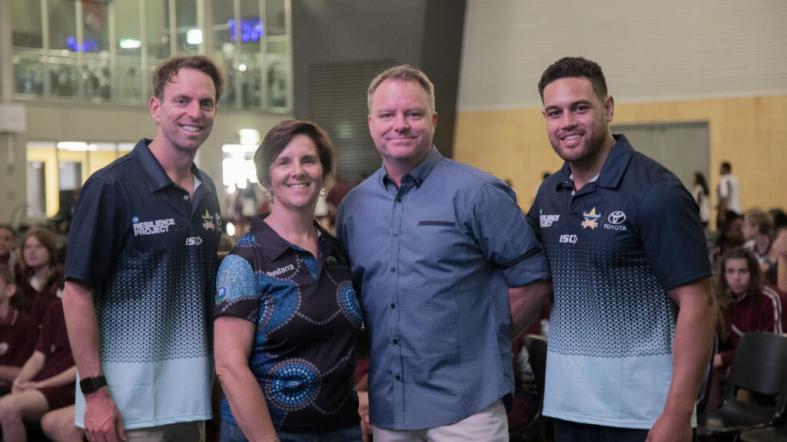The North Queensland Toyota Cowboys and The Resilience Project (TRP) are excited to be working with over 5,000 Cairns students, teachers and parents this week as the schools take their first step as part of the ‘TRP Northern family’.
Seven schools are participating in the Cairns TRP Program, which introduces the school communities to emotionally engaging skills and tools to help them become happier, more resilient and to build positive mental health and wellbeing.
Students are taking part in year-level presentations throughout the week, which are introduced by Cowboys community ambassador Antonio Winterstein and delivered by TRP Founding Director/Facilitator Hugh van Cuylenburg to up to 1,000 students per session.
The Cowboys and TRP are partnering with these schools to begin rollout of the in-curriculum program in 2020, made possible by funding from Northern Queensland Primary Health Network (NQPHN); Woree State School, Woree State High School, Balaclava State School, Whitfield State School, Cairns West State School, Bentley Park College (Primary & Secondary).
Herberton State School is also one of the first schools to sign up for the TRP digital program for 2020, with the Cowboys and The Resilience Project visiting the community on 21-23 October.
This week’s activities involve presentations across 13 sessions, with participating students ranging in age from Prep through to Year 12.
Cowboys program manager Gayle de la Cruz said their team was thrilled with the response from the schools involved this week.
“The TRP sessions are fun, thought-provoking and can be a very uplifting experience for the students and teachers as well,” Ms de la Cruz said.
“Our Cairns schools have been very engaged and receptive to the messages that Hugh and his team deliver, and we’re very fortunate to be working with teachers and principals who are so dedicated to their students’ resilience.
“We can all learn about gratitude, empathy and mindfulness and use these strategies in our own lives as well as teaching others, which is one of the reasons TRP is so impactful, and we’re looking forward to working with our Far North Queensland schools during the program.”
NQPHN CEO John Gregg said the implementation of TRP Program across Cairns schools will contribute to supporting young people in the region to be more resilient and live happier, healthier, longer lives.
“Mental health is a significant health issue facing young Australians, so teaching students the skills and strategies to build positive mental health and wellbeing from a young age will be incredibly beneficial,” Mr Gregg said.
“NQPHN congratulates the seven schools involved for joining TRP Northern family to provide their students, parents, and teachers with these important life skills.”
Overall, the Cowboys and TRP are currently partnering with four Townsville schools, with an additional eight Townsville schools and nine schools from Cairns and the Tablelands joining for the new school year, signalling 21 schools and approx. 15,500 students participating from the start of 2020.
TRP program focuses on four pillars – gratitude, empathy, mindfulness and emotional literacy – and empowers teachers with program resources, activities and knowledge to help inspire their students.
Parents and caregivers are also given practical ideas on how best to support their children in building resilience.
Tools to support individuals include a 21-day wellbeing journal, The Resilience Project app and ‘Gratitude Tree’ poster, available through Cowboys HQ.
Why we do it:
- 1 in 5 boys and 1 in 3 girls suffer from an anxiety disorder
- 1 in 7 primary school children have a mental illness
- 1 in 4 adolescents have a mental illness
- 65% of adolescents do not seek help for mental illness
For more information, visit theresilienceproject.com.au



